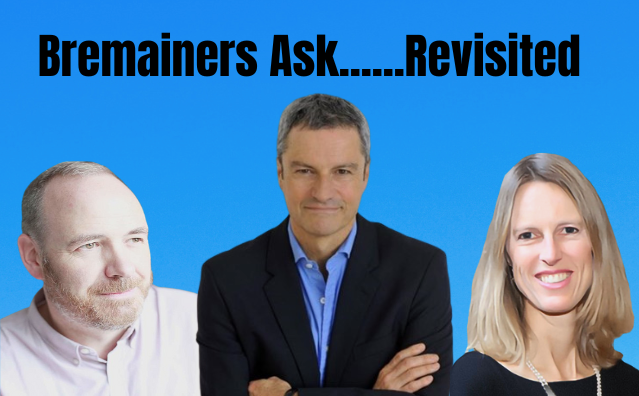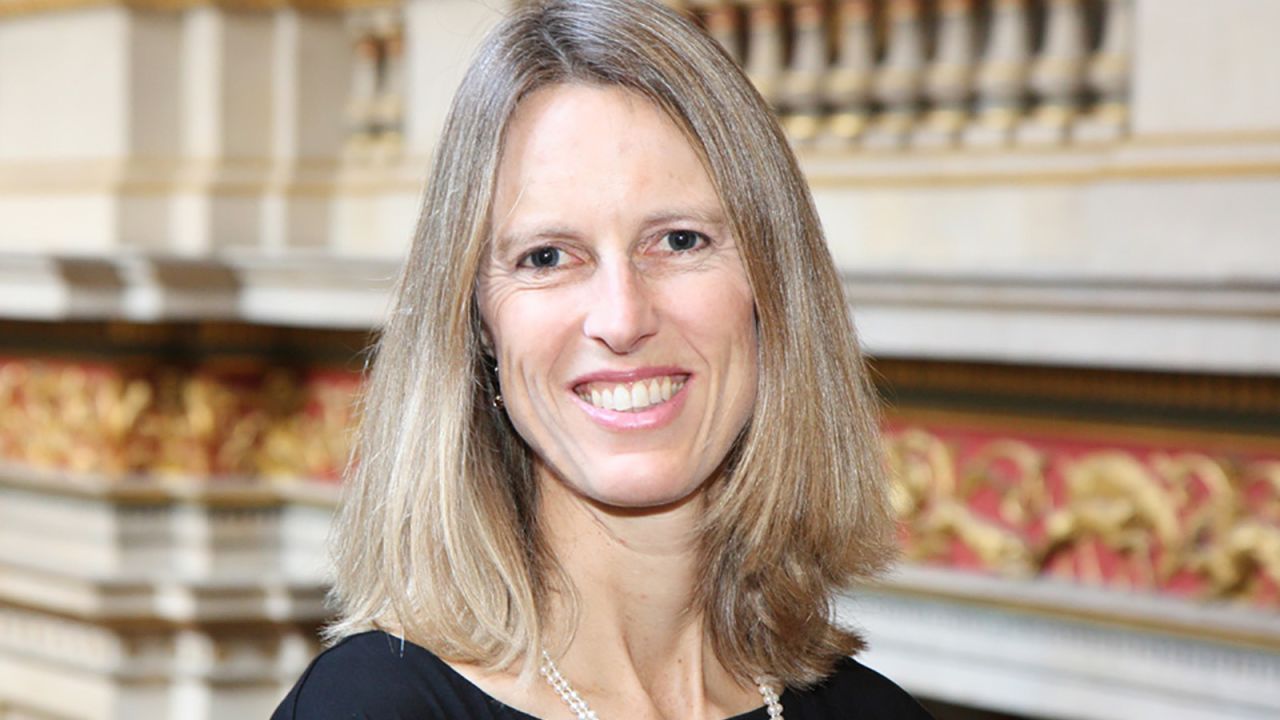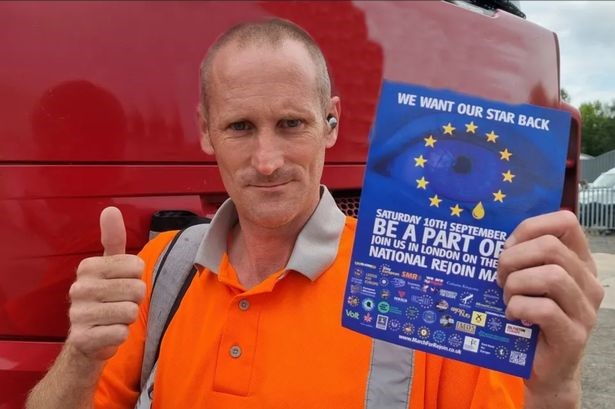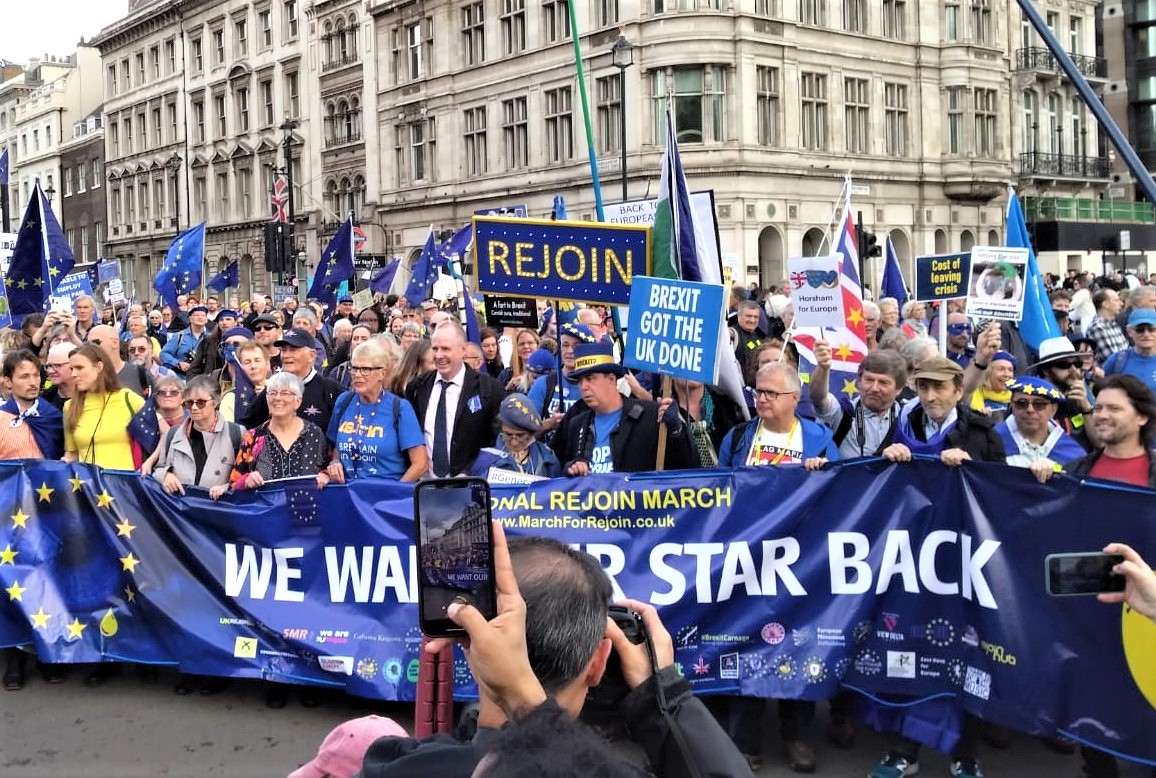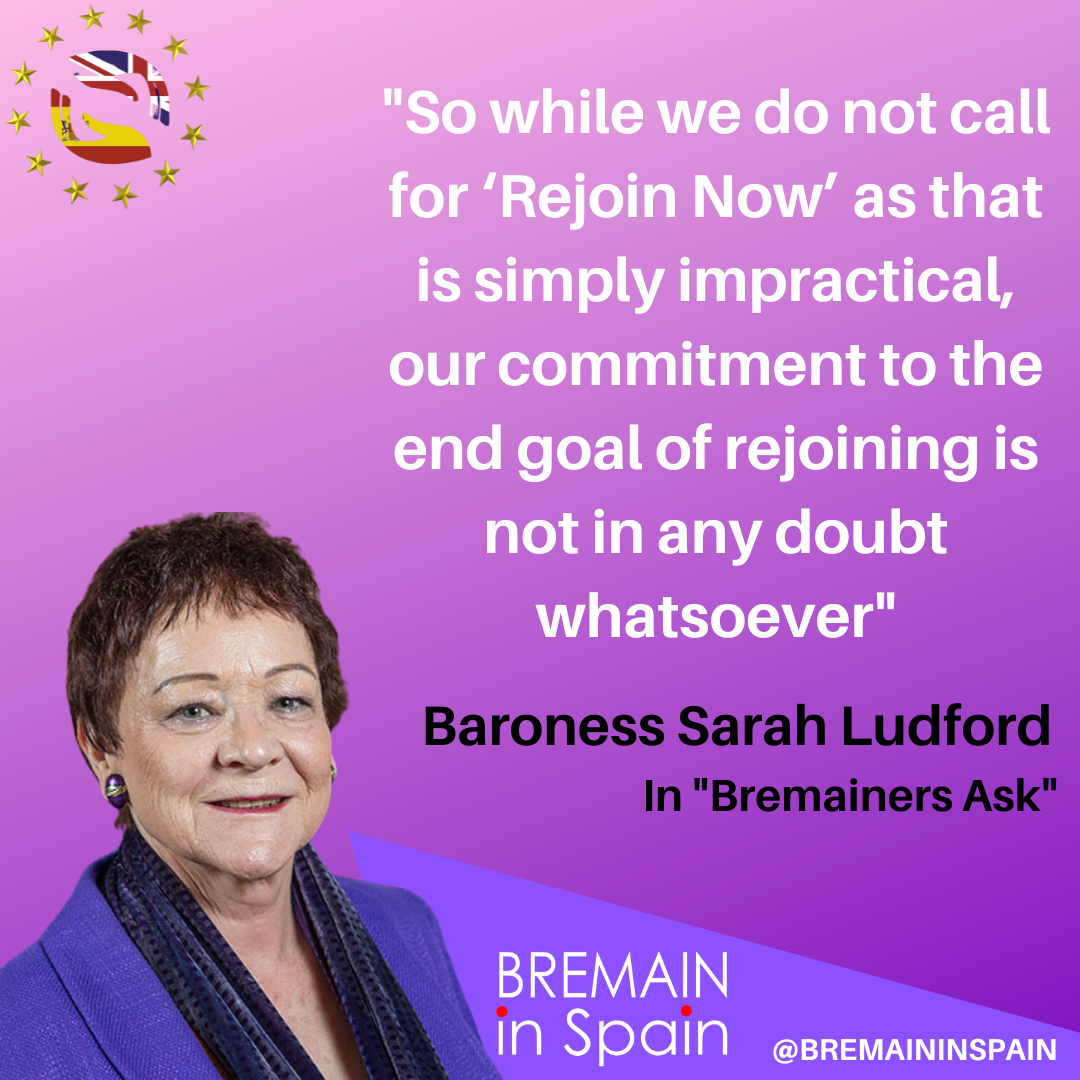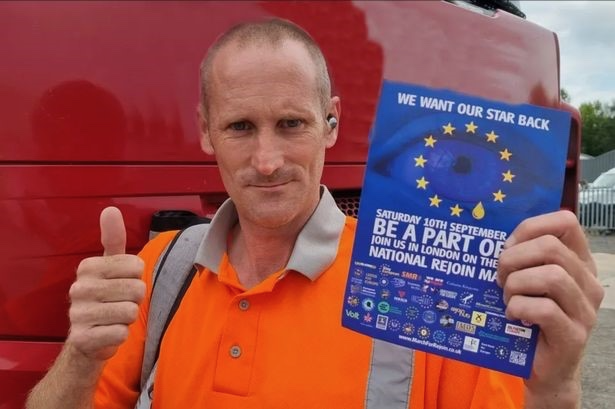
Bremainers Ask …. Russ Jones
Russ Jones is an author and political commentator with over 277,000 followers on Twitter where he regularly reports on #TheWeekInTory as @RussInCheshire. He is currently writing the sequel to his book The Decade in Tory. The new book will be entitled Four Chancellors and a Funeral.
Steve Wilson: Of all the government failures and cock-ups that you have catalogued in ‘The week in Tory’ are there any in particular that stand out for you?
I started The Week In Tory because of one event that made me laugh my head off: our Prime Minister, Fat Malfoy, had accidentally made it illegal to drive to Wales. I started tweeting about it, and as I was writing I realised about eight other stupid things had happened in the same week, so I listed them. People liked it, so I did it again, and here we are, two years (and two books) later.
But that one still sticks with me. How can a Prime Minister accidentally make it illegal to drive to Wales? How utterly, barnstormingly cretinous.
David Eldridge: Is the new agreement on Northern Ireland the beginning of the end for Brexit?
The beginning of the end of Brexit was 9am on 24 June 2016. It’s been dying since the moment it happened, but it will be a long, drawn-out death.
At heart, Brexit was nothing to do with Europe, or with the UK either. It wasn’t related to trade deals or borders, immigrants or sovereignty. At heart, Brexit was about disruption. It was a slogan in search of a policy, promising we could simply kick away the hidebound experts, and do something different. It never said what it would actually do, just not “this”.
But ultimately all governance is about organisation. It doesn’t matter if you’re Corbyn or Thatcher, Starmer or Sunak: your job is to organise things. The “this” people objected to was that organisation, which is always fiddly and complicated, but needs to be done. However, in the wake of Brexit we elected to government a libertarian populist movement, whose defining mission was an instinctive opposition to any kind of organisation whatsoever, and therefore a rejection of the very principles of government. We shouldn’t have been shocked when they turned out to be absolutely terrible at it.
And this, of course, means Brexit was inherently doomed from the get-go. I don’t think it’ll end quickly, I’m afraid, but I do think the Windsor (NI) agreement is the death of that libertarian, Johnsonesque populism. It’s the first time for years that a major policy decision has been based on rationality. It made me quite hopeful, which is an unfamiliar feeling!
Ruth Woodhouse: I understand that you have been scathing about what you see as Jeremy Corbyn’s role in the referendum and his subsequent actions. Do you feel that Keir Starmer has dealt with the Brexit fall-out better and taken the correct approach?
My main problem with Corbyn was his self-evident inability to win, which was clear very early in his leadership. If you don’t win, it doesn’t matter what you believe in, because you can never implement any of it. If, by some miracle, he’d have reached Number 10, he’d have buggered things up in a thousand ways. All politicians do, and Starmer will too. I’m not claiming Corbyn was uniquely incapable. But because he never got the chance to be catastrophic, his devoted army still believes him to be a sainted, lost King Over The Water. So he still haunts the Labour Party, despite being as relevant to our future as Jim Callaghan.
I do worry that Starmer is misreading the mood on Brexit. I understand why – where’s the election-winning value in reopening the Brexit wounds, which will probably only benefit the Tories?
But public opinion is now strongly anti-Brexit, Sunak is already delivering a softer Brexit in NI, and is even starting to talk about relaxing migration rules (although I’ll believe it when I see it). I think it’s a bad idea to box Labour in.
I think it’s inevitable that political and economic gravity will pull us back into the EU, in some form. I worry that by ruling out absolutely any formal relationship with the EU (such as joining the Single Market) Labour will find itself on the wrong side of history.
And Labour will inherit a terrible economy. The single best thing it can do for growth is to re-join the Single Market and Customs Union, which could help fund the NHS and all the other crumbling institutions left behind by the Tories. It seems daft to absolutely rule it out.
Brexit Trade Talks:
UK: We don’t like our deal
EU: Why not?
UK: We only get 95% of what we want
EU: It only gives us 95% too. That’s how negotiating goes
UK: We want a new deal that gives us everything we can think of
EU: But you signed a deal
UK: Don’t care, we hate you
— Russ Jones (@RussInCheshire) September 12, 2020
Anon: Assuming the Tory party suffer a major defeat at the next general election, do you think they can survive. If so, what do they need to do to transform their future fortunes?
All parties are coalitions, but the Tory party is taking it to extremes. They’re not so much a party as a patchwork of imaginary grievances thrown together by Mary Shelley’s imagination.
Since the late 80s, there been have countless simultaneous versions of the Conservative Party, engaged in a furious (and to most people meaningless) thirty-year battle over who gets to keep the name. A bit like Pink Floyd.
Thatcher held it together through force of will, and because she kept winning. That tenuous unity largely disintegrated under Major and the political minnows who succeeded him. Desperation for power made those who despised Cameron shut up long enough to win, but Brexit let the demons loose once more.
The unifying socioeconomic theories that held these factions together have been proven wrong beyond any doubt. Truss killed off 30 years of Tufton Street fantasy economics in a single afternoon, and now there’s not much holding them together. If (as I hope) Labour introduce voting reform, the last thing binding the Tories as a single entity – FPTP – would be gone, and they’d all be free to follow their own mad dreams.
From the chaos a new, centre-right party of rational humans could emerge, consisting of people like Dominic Grieve or Ken Clarke. I don’t agree with them about much, but I can see their essential value and the thought process from which their policies emerge. And we need them.
I’m life-long Labour, but I’m not daft enough to think any party should face no viable opposition. Every government needs holding to account, and a sound, sensible centre-right party would be good for Britain, even from the opposition benches. Meanwhile the maniacs can all vanish into the anonymity of GB News for a decade-long circle-jerk, while the grown-ups get on with governing.
Mike Phillips: Does the current Tory party represent the dying embers of the British Empire and what lessons are there for the way we select our MPs?
I don’t think Britain knows what it’s for any more. A quarter of the world’s population was under British rule in 1880, and because we had all the money, jobs, flags and – quite importantly – guns, English ended up as the world’s default second-language. And we ended up assuming this makes us inherently important. It doesn’t.
150 years on, we’re a small, wet, heavily indebted island with few trading partners, no essential industries, and no means of feeding ourselves. We tell ourselves we’re the fifth biggest economy, but Panda is the fifth biggest cola company. I don’t see Pepsi shitting themselves.
We used to be a valued bridge between the USA and Europe, but Brexit broke half of that, and the shift in global power towards China has undermined the rest. We were once a beacon of stability, diplomacy and legal certainty, but now we smash international laws so we can treat migrants like cockroaches, and elect a PM who tells America to “fuck off”.
Unless we come to terms with our true status and build new partnerships for the next century, I don’t see a great way forward. And there is no partnership except the EU. We have no other neighbours. The EU is it.
As for MPs: we need massive democratic reform, and as part of that I’d like to see far fewer people in Westminster (we have the largest Parliament except China, which has 22 times our population). Instead, more local representation, better funding and powers for regions, and (this won’t be popular) pay the remaining MPs a lot more money. It’s a hugely challenging job with no pension, and if you want good people you need to pay for them. And we do need good people. But we should outlaw all second-jobs or political donations. Unless we have publicly funded political parties, political parties will always be in somebody’s pocket.
If something is offered to you for free, YOU are the product. That applies to politics too.
Lisa Burton: It’s a tough choice, but which politician do you think is the most dangerous regarding language and intention?
Steve Barclay. We’re all focused on the performatively evil Suella Braverman, the flagrantly pompous Rees-Mogg, and the shamelessly law-breaking Boris Johnson. But in the nooks and crannies behind the crooks and nannies, you’ll find Steve Barclay, diligently tearing apart the fabric of our society.
Of all the people I’ve written about, he’s the one safest from character assassination, because he was born without one. But he’s a wildly destructive force, sometimes holding three ministerial positions at once, and wreaking havoc across all levels of government. He gets away with it because he’s so effortlessly bland. Half the people I mention him to assume I mean Steve Baker.
Next month in Bremainers Ask – Anand Menon is Professor of European Politics and Foreign Affairs at Kings College London. He also directs the UK in a Changing Europe project. His areas of research interest include the policies and institutions of the European Union, European security, and British politics. He contributes regularly to both print and broadcast media. He is co-editor of the Oxford Handbook of the European Union (OUP, 2012), and co-author of Brexit and British Politics (Polity 2018). He is a trustee of Full Fact, a member of the Strategic Council of the European Policy Centre, a Council member of the European Council on Foreign Relations and an associate fellow of Chatham House.
If you have any questions you would like to put to Anand, please email them to us no later than Sunday 4 April.



